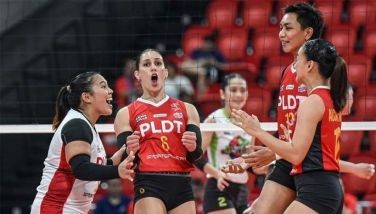Baptism of fire

It won’t only be a baptism of fire for five rookie players but also for interim head coach Mark Dickel when the Philippines battles Indonesia in the first window of the FIBA Asia Cup qualifiers at the Mahaka Arena in Kelapa Gading, North Jakarta, tonight.
In the PBA, Dickel is listed as an active coaching consultant with TNT to comply with an Basketball Coaches Association of the Philippines (BCAP) rule but is the de facto head coach. With Gilas, Dickel is recognized by FIBA as head coach although in SBP’s scheme of things, he’s on an interim basis. SBP’s vision is to sign up a full-time national coach sooner than later or at least in time for the second window in November. After the first window, Dickel will return to TNT in the PBA. Former Olympic and World Cup coach Tab Baldwin will remain on top of Gilas’ program as head of operations.
For the Jakarta game, Dickel will be backed up by assistants Sandy Arespacochaga, Topex Robinson and Alex Compton. There’s chemistry among the four. Dickel and Arespacochaga work together at TNT while Compton and Robinson were partners in the Alaska coaching staff. This is Dickel’s second head coaching job with a national team. He was Albania’s coach in 2010-11.
Five of Dickel’s 12 players for the game against Indonesia are making their Gilas debut – Juan Gomez de Liaño, Justin Chua, Isaac Go, Matt Nieto and Dwight Ramos. C. J. Perez wasn’t among 33 players who were rotated to suit up for Gilas in the six-window FIBA Asia World Cup qualifiers in 2017-19 but made it to the lineup for the World Cup in Foshan last year. Perez is back on the Gilas roster.
There are five amateur and seven PBA veterans in the cast. The amateurs are Thirdy Ravena (who played in two World Cup qualifying games), Gomez de Liaño, Go, Ramos and Nieto. The pros are Perez, Kiefer Ravena, Abu Tratter (who played in one World Cup qualifying game), Poy Erram, Troy Rosario, R. R. Pogoy and Chua. Reserves are Javee Mocon, Rey Suerte and Jaydee Tungcab. The team has an average height of 6-4 and average age of 25. The youngest is Gomez de Liaño, 20 and the oldest is Erram, 30. Chua is also 30 but Erram is six days older. Gilas will not suit up a naturalized player.
It shouldn’t be a problem for Gilas to defeat Indonesia on the road. The Indonesian team has an average height of 6-2 and average age of 25. Like Gilas, Indonesia didn’t enlist a naturalized player but not by choice. Lester Prosper would’ve been in coach Rajko Toroman’s roster if only he had an Indonesian passport.
Gilas’ first qualifying game should’ve been against Thailand last Thursday but it was cancelled. There’s still no advice from FIBA when it will be rescheduled. Indonesia played its first game against South Korea in Jakarta last Thursday and lost, 109-76. But the home team put up a spirited fight and even led, 27-21, at the end of the first period. Indonesia’s biggest advantage was nine but Toroman was in the driver’s seat only for 7:44 minutes. When the Koreans got down to business, it became a massacre. The stats showed Indonesia’s weaknesses which Gilas will no doubt exploit. Indonesia was outrebounded by 13, had seven less assists, compiled 11 more turnovers and shot a lowly 38.3 percent from the field compared to Korea’s 52.8 percent. In bench points, Korea had an overwhelming advantage, 72-13. In fastbreak points, Korea scored more, 15-3.
Only three Indonesians finished in double figures against Korea – 5-10 Abraham Grahita 25, 5-8 Prastawa Dhyaksa 14 and 6-5 Kevin Sitorus 11. Toroman also got quality minutes from another guard 5-10 Hardianus Lakudu who collected six points and five assists. Indonesia’s bigs were virtually non-existent. Derrick Xzavierro, 16, is a 6-8 project who was scoreless in two minutes. Starting center Vincent Kosasih, also 6-8, had five points and four boards in 26:56 minutes. New York City-born Arki Wisnu, the team’s oldest player at 31, was a disappointment with two points and four fouls in 16:03 minutes.
The FIBA Asia Cup will be held on Aug. 3-15 next year. The quadrennial continental competition is a stand-alone tournament, meaning it’s not a qualifier for either the Olympics or World Cup. In the previous FIBA Asia Cup in Beirut in 2017, Australia wound up No. 1 and the Philippines, No. 7.
There are 24 teams, including 16 seeds, participating in the current qualifiers. Eight teams made it through a series of pre-qualifiers – Saudi Arabia, Palestine, Bahrain, Sri Lanka, Malaysia, Indonesia, Guam and Thailand. Eliminated in the pre-qualifiers were Macau, Fiji, Singapore, Bangladesh, United Arab Emirates, Oman, Brunei, Cambodia, Maldives, Bhutan and Nepal.
The 24 teams are split into six groups of four each. The Philippines, Thailand, Indonesia and South Korea are in Group A; Chinese-Taipei, Malaysia, Japan and China in Group B; New Zealand, Australia, Hong Kong and Guam in Group C; Bahrain, Lebanon, India and Iraq in Group D; Iran, Saudi Arabia, Qatar and Syria in Group E and Kazakhstan, Palestine, Jordan and Sri Lanka in Group F. The top two finishers of each group, totaling 12, will book automatic tickets to the FIBA Asia Cup next year. The last four seats will be contested by the six third placers of each group in another elimination round.
Although it’s not a World Cup or Olympic qualifier, the FIBA Asia Cup is taken seriously by countries in the region. Bahrain, for instance, recruited former Michigan State star and NBA veteran Sam Vincent as head coach and C. J. Giles as a naturalized player. India’s coach is Veselin Matic of Serbia while Qatar’s coach is Panayiotis Yiannakis of Greece. American Joey Stiebing coaches Jordan. Lebanon’s naturalized player is 6-10 Ater Majok, born in Sudan, grew up in Sydney, played for the University of Connecticut and was the Los Angeles Lakers’ second round draft pick in 2011. Other naturalized players in the first window are Anthony Clemmons of Kazakhstan, Demario Mayfield of Iraq and Dar Tucker of Jordan.
Qatar has several foreigners in its lineup, including Senegal’s Babacar Dieng and Bosnia natives 7-1 Meho Haracic, 6-10 Emir Mujkic and 6-7 Faris Avdic. In 2014, Qatar naturalized nine Bosnian players, all below 16, to comply with the FIBA rule to enlist foreigners as locals for as long as their passports were issued before turning 16. The nine Bosnians were Haravic, Mujkic, Avdic, Alen Hadzibegovic, Hamza Kurtovic, Jasmin Memic, Nedim Muslic, Faris Sadikovic and Kaid Zubovic. Isn’t that a mockery of the FIBA eligibility rule when a Fil-foreigner, who is part Filipino by blood, is disallowed from playing as a local for the Philippines because he or she was issued a passport after turning 16?
- Latest
- Trending





























